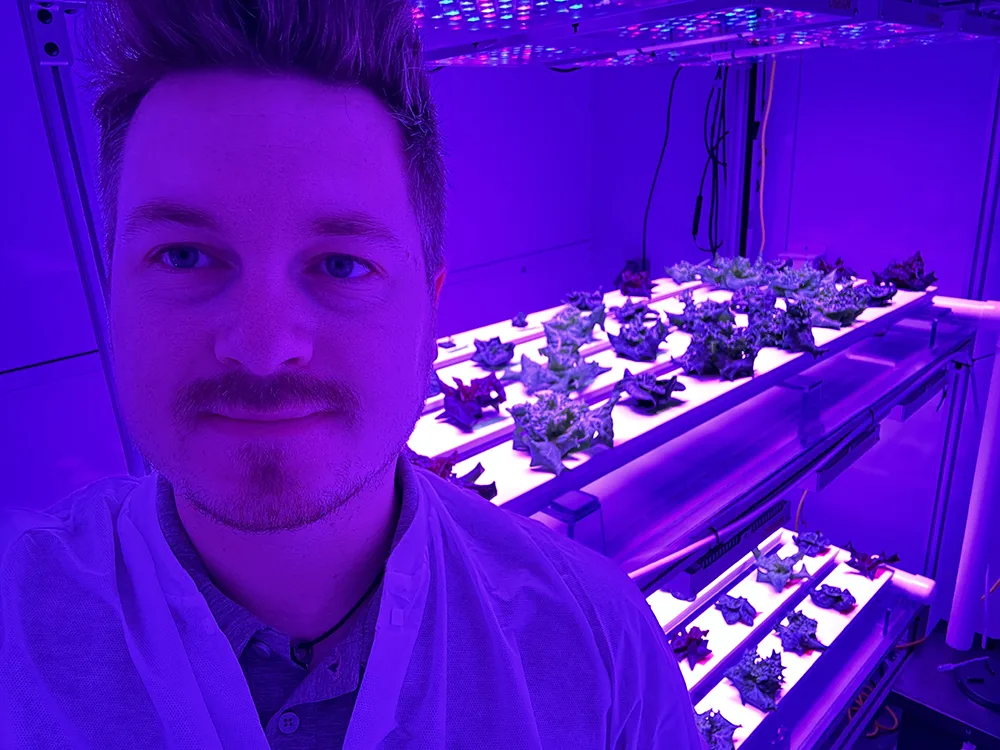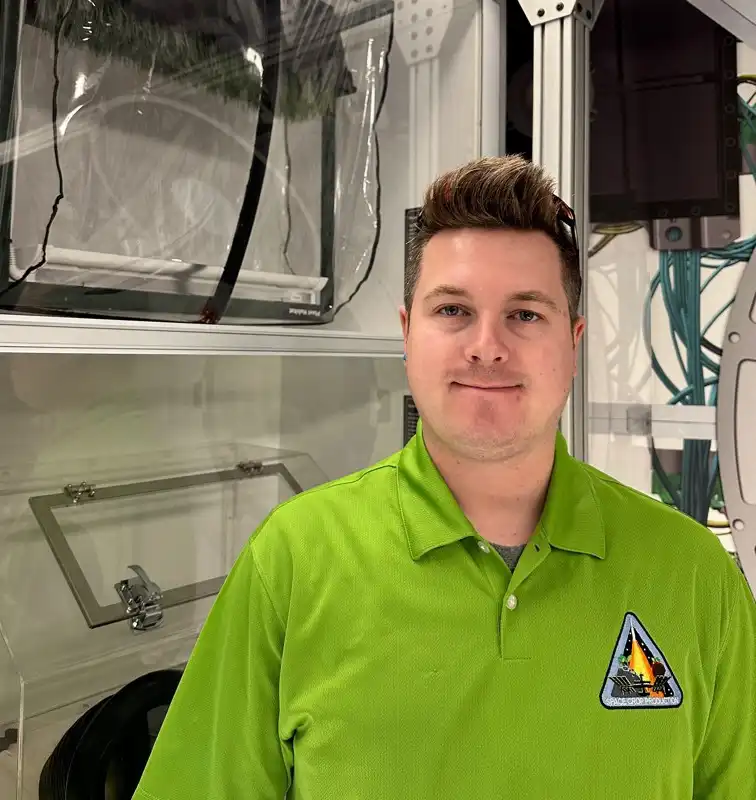NPP participant Luke Fountain’s mission to grow food among the stars

Harnessing plant biology for deep space exploration: Luke Fountain, Ph.D., NASA NPP Fellow, returns to the podcast
Luke Fountain, Ph.D., who is in the third year of his NASA Postdoctoral Fellowship, makes a return to Further Together because of a recently published paper he co-authored on plant biology and space exploration. His research focus is figuring out how to grow plants in space to help enable future deep exploration. In this conversation, Fountain shares the challenges of plant biology in space, including the need to make growing systems self-sustaining. The paper he co-authored, published in the New Phytologist in November 2025, lays out a 12-point framework called the Bioregenerative Life Support System readiness level to assist in overcoming challenges to establish resilient, sustainable crop production.
Center: Kennedy Space Center
When molecular biologist Luke Fountain joined the NASA Postdoctoral Program (NPP), he wasn't just continuing his scientific journey, he was helping shape the future of food in space.
Now in his second year as an NPP fellow, Fountain works at NASA’s Kennedy Space Center as part of the Space Crop Production Team. His mission: figure out how to grow sustainable, nutritious crops in space to support long-duration missions, including potential journeys to the Moon and Mars.
“Nothing in space is easy,” Fountain says. “But plants offer so many benefits such as nutrition, psychological comfort, even atmospheric control. We need to understand how to grow them effectively beyond Earth.”
Fountain’s path to NASA wasn’t linear. Originally drawn to physics, he pivoted to geology, then landed in molecular biology. While earning his undergraduate degree at the University of Sheffield in England, he became fascinated by plant biology and space research happening on the International Space Station.
That curiosity led him to pursue masters and doctoral degrees in plant and soil sciences. Although his doctoral work wasn’t space-focused, he ran independent projects on the side that explored how plants respond to high carbon dioxide (CO₂) environments, projects that laid the foundation for his eventual NASA fellowship.
Early in his doctoral studies, Fountain reached out to Ray Wheeler, a leading figure in space plant biology, hoping to arrange a short internship. Wheeler responded enthusiastically, and while COVID disrupted those plans, the connection proved pivotal. Years later, Fountain is now working in the same hallway. “To go from emailing someone like Ray and hoping for a reply to being mentored by him, it’s amazing,” he says.

Unlocking the challenge of growing food in space: A conversation with Luke Fountain, Ph.D., NASA Postdoctoral Fellow
Luke Fountain, Ph.D., is a NASA Postdoctoral Fellow on the Space Crop Production Team at Kennedy Space Center in Florida. The UK native's research focuses on on supplementing astronauts' diet with fresh food that is grown in space. "Eventually, we're hoping to replace calories. And as we transition to become more earth-independent, obviously, we want the astronauts to be able to supply, grow more of their own food, so we're less reliant on resupply," he said during his interview for Further Together. Fountain adds that growing plants in space is not easy, and that part of the challenge involves the significantly higher carbon dioxide levels in the International Space Station, where experiments involving plants take place. Learn more about Fountain's research and its importance to future space flight during this episode.
At Kennedy Space Center, Fountain focuses on a key challenge for space agriculture, elevated CO₂ levels. On Earth, atmospheric CO₂ is around 420 parts per million (ppm), but on the International Space Station, it averages 3,000 ppm. That level significantly alters plant growth, especially how plants absorb nitrogen, a vital nutrient.
“There are different forms of nitrogen, ammonium and nitrate,” Fountain explains. “In high CO₂ environments, plants struggle to process nitrate, but they can still use ammonium.”
His doctoral research showed that spring barley preferred ammonium over nitrate under these conditions. He is expanding this research to lettuce, a candidate space crop, and has confirmed similar nitrogen uptake patterns. The findings could shape future plant nutrition strategies in microgravity.
“We’re trying to determine the best ammonium-to-nitrate ratio,” Fountain says. “Not just to support plant growth—but also to protect human health, since nitrate can be harmful in large quantities.”
Fountain sees his NPP experience as an extension of his doctoral work and a crucial career breakthrough. “Most space crop research happens in the U.S.,” he says. “This fellowship gave me a way into that field.”
The transition from academia to NASA came with adjustments—longer timelines, more regulations and limitations as a foreign national. Still, Fountain is energized by the work, the mentorship, and the view; he gets to watch rocket launches almost weekly. “You never get tired of that,” he says.
To those hoping to follow in his footsteps, Fountain emphasizes perseverance and passion. “Take every opportunity. Apply even if you think it’s a long shot,” he advises. “Science is hard, but you’ve got to enjoy what you do. That’s what keeps you going.”
As for what comes next, Fountain plans to stay in the field of space crop production. “This is where I want to be. I’ll be actively looking for opportunities to continue this work.”
When not in the lab, Fountain indulges in another passion: Star Wars. Living near Florida’s Galaxy’s Edge theme park, he visits frequently. “That definitely brings me joy,” he says. “But honestly, coming to work does too.”
From a university plant lab in the United Kingdom to leading-edge research at NASA, Fountain’s journey reflects the power of curiosity, resilience and taking the shot.
The NASA Postdoctoral Program (NPP) offers unique research opportunities to highly-talented U.S. and non-U.S. scientists to engage in ongoing NASA research projects at a NASA Center, NASA Headquarters, or at a NASA-affiliated research institute. These fellowships, awarded annually up to three years, are competitive and are designed to advance NASA’s missions in space science, Earth science, aeronautics, space operations, exploration systems, and astrobiology.
